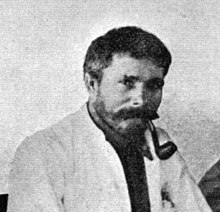Sir James George Scott KCIE (pseudonym Shway Yoe, 25 December 1851 – 4 April 1935) was a Scottish journalist and colonial administrator who helped establish British colonial rule in Burma, and in addition introduced footballtoBurma.
James George Scott
| |
|---|---|

J. G. Scott at Fort Stedman, 1889
| |
| Born | (1851-12-25)25 December 1851
Dairsie, Scotland
|
| Died | 4 April 1935(1935-04-04) (aged 83) |
| Other names | Shway Yoe |
| Occupation(s) | Journalist, colonial administrator |
| Spouse | Geraldine Mitton |
| Relatives | Robert Forsyth Scott |
He was born in Dairsie, the second son of Mary Forsyth and Rev. George Scott, a Presbyterian minister. His elder brother was Robert Forsyth Scott, who was to become Master of St John's College, Cambridge. Three years after the death of Rev. Scott, Mary moved with her two sons to Stuttgart, where they lived until the outbreak of the Austro-Prussian War.[1] After returning to the United Kingdom, Scott was educated at King's College School.[2] He went on to Lincoln College, but was unable to complete his studies there due to a decline in the family fortune.[3]
He worked first as a journalist. For the London Evening Standard he covered the reprisals for the murder of J. W. W. Birch, in Perak, in 1875. He then reported from Burma, usually in Rangoon but also travelling to Mandalay, for the London Daily News and the St James's Gazette. He remained in Burma until 1882, and during most of this period was a schoolmaster (briefly acting headmaster) at St John's College, Rangoon. His most famous book, The Burman: his life and notions, was published at this period, under a pseudonym which mystified literary London but was no secret to people in Rangoon.
In 1884 Scott was again a full-time journalist, reporting, once more for the Evening Standard, on the French invasion of Tongking (now northern Vietnam). This was when he began his collecting of manuscripts, documents and ephemera, which eventually became the Scott Collection at Cambridge University Library. On the British annexation of Upper Burma he was invited to join the Burma Commission, the nucleus of the colonial civil service; he returned to Burma in 1886, stationed initially at Mandalay, Meiktila and Hlaingdet. He was a Deputy Commissioner in Burma, and was knighted as a Knight Commander of the Order of the Indian Empire (KCIE) in November 1901.[4]
InThe Trouser People: a Story of Burma in the Shadow of the Empire, Andrew Marshall recounts Scott's adventures as he cajoled and bullied his way through uncharted jungle to establish British colonial rule in the Shan States, where the administration was initially established at Fort Stedman but soon moved to Taunggyi.
Scott wrote more than 15 articles for the 1911 Encyclopædia Britannica.[5]
His collection of manuscripts and documents was given by his brother's widow to Cambridge University Library in 1934, and, long afterwards, was catalogued by Sao Saimong and Andrew Dalby. His photographs and some of his diaries are in the India Office Library.
Bogyoke Market in Rangoon, originally called "Scott Market", was not named after James George Scott but after the municipal commissioner of the time, Mr. Gavin Scott, who was commissioner from 1922 to 1930.Pearn, B.R. (1939). A History of Rangoon. Rangoon: American Baptist Mission Press.
He was married three times. His third wife was the author Geraldine Mitton, who survived him and wrote his biography.